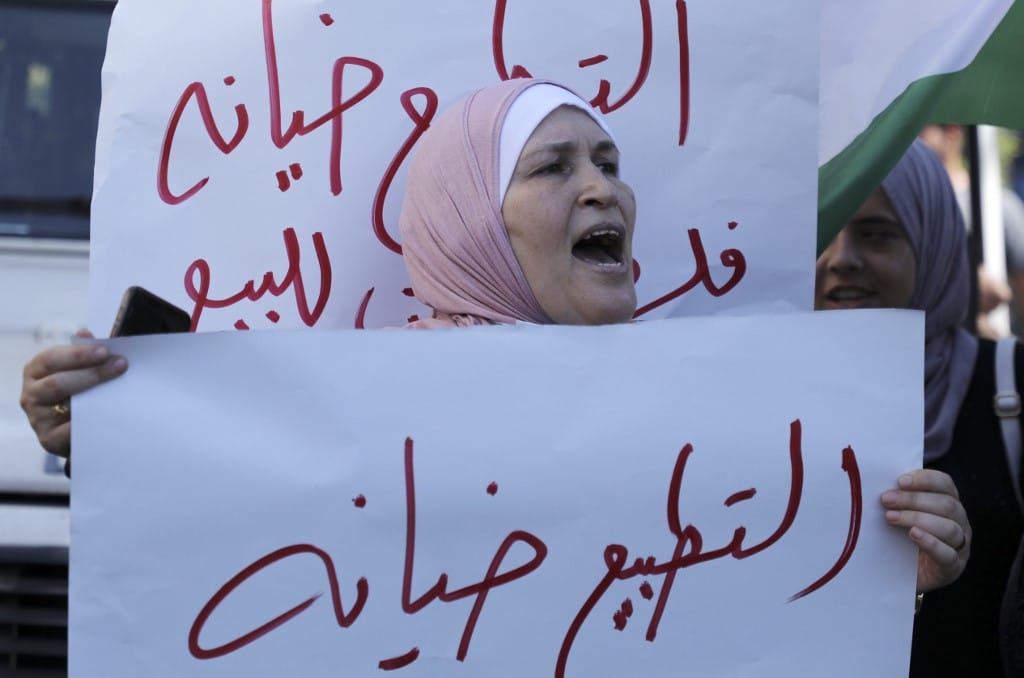The UAE, for one, made peace with Israel partly to acquire the advanced F-35 jets, which the U.S has long denied the Emirates in order to preserve Israel’s significant military advantage in the region. Netanyahu, who allegedly agreed to allow the UAE to acquire F-35s, denied that concession days after the peace deal was announced, prompting the UAE to cancel a trilateral meeting between U.S and Israeli officials on August 24.

Israel and the United Arab Emirates (UAE) fully normalized relations on 13 August 2020, adding another major obstacle for Palestinians in their quest for statehood. U.S President Donald Trump took credit for brokering the deal, which he’s now touting as a major foreign policy achievement ahead of what promises to be one of the most significant elections in American history.
The UAE claims that the agreement helps Palestinians by obliging Israel to delay plans to annex the West Bank, a move that would sabotage the global consensus of a two-state solution. The agreement equally represents a major achievement for Israeli Prime Minister Benjamin Netanyahu, who has long argued that peace with Palestinians could only occur if Israel first normalized relations with Arab states.
But for Palestinians, the deal fails to address the construction of illegal settlements in the West Bank and East Jerusalem, thus legitimizing Israel’s military occupation and apartheid rule. Critics add that the agreement severely undermines the Arab Peace Initiative (API), which became the primary framework to negotiate an end to the Palestinian/Israeli conflict in 2002.
According to the API, Israel must withdraw from the 1967 borders and allow for an independent Palestinian state in exchange for normalizing relations with the Arab world. Saudi Arabia, under King Salman, reiterated its support for API shortly after the peace deal was announced. However, Bahrain and Oman congratulated Israel and the UAE for taking “a step towards the achievement of peace in the Middle East.”
Israel’s Intelligence Minister, Eli Cohen, told Army Radio that he suspects Bahrain and Oman to soon establish formal ties with Israel. The Bahraini King, Hamad bin Isa Al Khalifa, has made overtures to Israel in recent years under the guise of fostering religious tolerance. And like its Gulf neighbours, Bahrain has purchased sophisticated cyberware technology from Israeli front companies to monitor and persecute its majority Shiite population.
Meanwhile, the late leader of Oman, Sultan Qaboos bin Said, invited Netanyahu to Muscat two years ago. The meeting indicated that the two leaders were working towards establishing open communication and official ties in the near future. The U.S and UAE are also pressuring Sudan to make peace with Israel in exchange for lifting Khartoum off the list of states that sponsor terrorism – a designation that is crippling Sudan’s economy and impeding its transition to democracy.
Sam Bahour, a policy advisor for the independent Palestinian think-tank Al-Shabaka, told Fanack that he believes the UAE wouldn’t embark on establishing formal ties with Israel unless other Arab states made promises to follow. He added that the deal between Israel and the Emirates represents nothing more than Trump and Jared Kushner’s failure to bully Palestinians to sign off on their Middle East Peace Plan.
“Trump wants to tell Americans ‘look we’re making progress’ with this agreement, but progress can only be made by working with Palestinians,” Bahour told Fanack over a video call.
Despite the covert relationship between Israel and Gulf states, some leaders may be thinking twice about establishing diplomatic ties with Israel. Their fear, of course, is that normalizing ties could spark social unrest. Just take Bahrain, which saw a coalition of 23 political and civil society groups declare their opposition to normalizing relations with Israel after Trump’s announcement. In Kuwait, 29 political parties and civil society groups released statements that fervently called for a unified stance against normalization. And in Oman, the Grand Mufti issued a statement calling for the liberation of Al-Aqsa mosque and surrounding Palestinian lands.
Nevertheless, Gulf states are anxious to see if the agreement between the Emirates and Israelis holds. Some Arab leaders might conclude that normalizing ties with Israel won’t bring them more advantages since they are already benefitting from security cooperation with Israel. NSO group – an Israeli cyber intelligence company – is a case in point. The Gulf is the most profitable division for NSO group, which relies on Israeli representatives to advertise meetings between its executives, Israeli intelligence officials and Arab states.
The cooperation is unsurprising considering that Israel and repressive Arab tyrants have common enemies in the region. In the case of the UAE, Saudi Arabia, Bahrain and Israel, they all believe that Iran threatens their regional hegemony. An alliance with the Israelis would also help Gulf states form a stronger and more reactionary axis against the Muslim Brotherhood, a franchise supported by regional rivals Qatar and Turkey.
The UAE, for one, made peace with Israel partly to acquire the advanced F-35 jets, which the U.S has long denied the Emirates in order to preserve Israel’s significant military advantage in the region. Netanyahu, who allegedly agreed to allow the UAE to acquire F-35s, denied that concession days after the peace deal was announced, prompting the UAE to cancel a trilateral meeting between U.S and Israeli officials on August 24.
The disagreement has casted doubt over whether the peace deal will hold. But the U.S envoy for Iran, Brian Hook, told Axios that the U.S will find a way to bolster the Emirates defense systems without compromising its security commitments with Israel.
“[The UAE and Israeli agreement] create space for more cooperation on security,” Hook said. “Any conversations that are needed around Israel’s qualitative military edge will take place.”
Many Palestinians, meanwhile, are upset that their leadership was so poorly prepared for Trump’s announcement. Ahmed Majdalani, the Palestinian Authority’s (PA) minister of social affairs, told Al Jazeera that nobody in his circle was given prior knowledge that an agreement was made.
Bahour, from Al-Shabaka, said that the PA shouldn’t have been surprised at all. In his eyes, the PA should have known for years that its Gulf allies would eventually abandon the Palestinian cause for good. He added that Palestinians must act now to hold their leadership accountable.
“Palestinians are now speaking boldly about the PA’s inability to reach statehood or even reconcile with other Palestinian parties,” Bahour told Fanack. “Palestinians are now thinking about how the current leadership can be retooled.”
History of the Palestinian-Israeli Conflict
This article is part of our coverage of the history of the Palestinian-Israeli Conflict.
Fanack’s historical record meticulously chronicles the Palestinian-Israeli Conflict in a chronological sequence, encompassing its origins, crises, wars, peace negotiations, and beyond. It is our most exhaustive historical archive.




